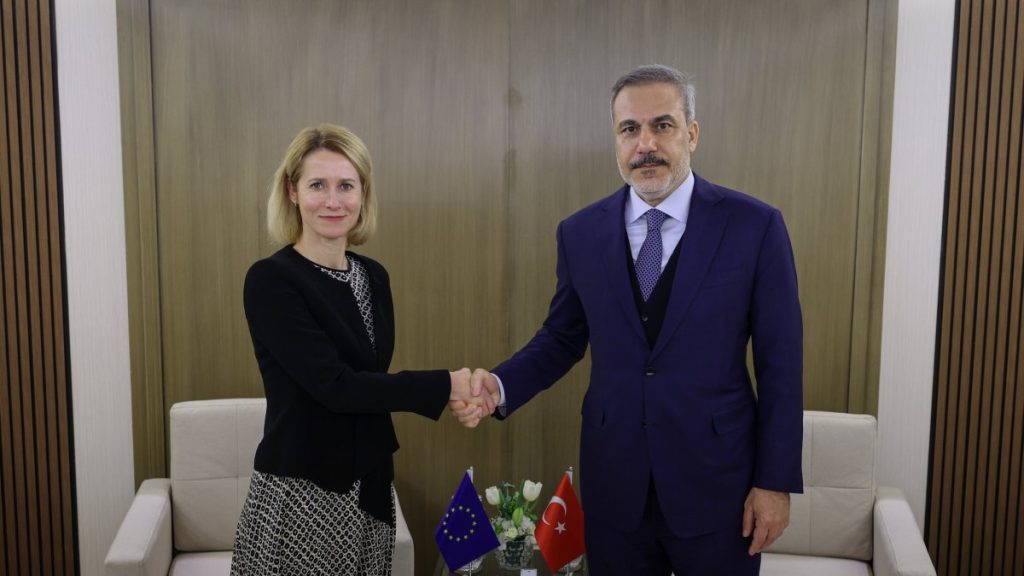Ankara is looking to gain momentum in long-frozen ties with the European Union as the bloc’s high representative for foreign affairs and security policy, Kaja Kallas, is set to pay Türkiye an official visit this Friday for talks on regional developments and bilateral ties.
Kallas is expected to hold high-level talks with Turkish officials on regional foreign policy issues, steps in defense and security, and the development of Türkiye-EU relations.
In 2024, Türkiye-EU ties were discussed at length, and in 2025, Türkiye expects the European Investment Bank (EIB) to overcome obstacles at high-level political dialogue meetings on the economy, transport, energy and politics, the country’s ambassador to the bloc, Faruk Kaymakçı, said.
Türkiye has been a candidate for EU membership for over two decades, but talks stalled in 2016 over what Ankara says is the bloc’s “insistence on politicizing the issue.”
Türkiye suggests it has fulfilled most of the criteria for membership. Though the accession process stalled, the country has remained a key economic and defense partner for the 27-member bloc.
Hope for 2025
According to Kaymakçı, Türkiye is entering 2025 with greater hope in light of the European Commission’s enlargement and Türkiye reports, which mark Ankara’s progress in certain areas of its membership criteria, as well as key developments in bilateral ties in 2024.
“Our Foreign Minister (Hakan Fidan) was invited to the Gymnich meeting after five years, which was highly beneficial as the minister conveyed firsthand Türkiye’s determination on membership and capabilities for cooperation with the EU on foreign policy, security and defense,” Kaymakçı told Anadolu Agency (AA) in a review of 2024.
He also pointed out European Commission chief Ursula von der Leyen’s visit to Ankara last month as a promising development for normalizing and improving Türkiye-EU ties by 2025.
Von der Leyen met with President Recep Tayyip Erdoğan on Dec. 17 and discussed the latest situation in Syria after the fall of the Assad regime, financial support for rebuilding, counterterrorism and the Turkish accession.
The membership has strategic importance for Türkiye, which expects the EU to lift restrictions, high-level dialogue to be revived, the customs union to be updated and the visa process to be facilitated until full visa liberalization, Erdoğan told a joint news conference with von der Leyen.
For her part, the EU chief called Turkish-EU relations “rich and complicated” and instead pointed to growing economic relations, saying the bloc seeks to increase trade volume of 206 billion euros in the coming term.
After Kallas, EU Commissioner for Enlargement Marta Kos is also scheduled to visit Türkiye in the next couple of months, Kaymakçı said.
Kallas, who took office on Dec. 1, 2024, also met with Fidan at meetings on Syria in Jordan and Saudi Arabia.
Kaymakçı argued it was “utterly senseless” for high-level political dialogue and Partnership Council meetings to be still blocked by the EU, which focus on regional policies, bilateral relations, security and defense.
“Because if Türkiye and the EU want a healthy cooperation on foreign policy and security, this can only happen with an established mechanism,” he said, noting that one of Türkiye’s chief expectations this year is the implementation of such mechanisms.
In an interview released last month, Fidan urged the EU to return to the “pre-Sarkozy” era for Türkiye’s membership process, which he said included a more “strategic view” of Türkiye and the bloc fell victim to “domestic policies and identity politics” after French President Nicolas Sarkozy took office in 2007.
Economic dialogue
After the presidential and parliamentary elections concluded in May 2023, Brussels shifted its rhetoric from “the importance of cooperation with Türkiye” to “continuing relations on a strategic and forward-looking basis.”
From July 2019, when the bloc imposed certain restrictive measures against Türkiye until November 2023, the EU never raised a concrete suggestion to normalize relations, Kaymakçı said.
“There has yet to be a concrete move from the EU to meet Türkiye’s expectations,” the envoy said, despite the EU summit at the end of 2024 signaling it could clear the way for High-Level Economy Dialogue to and EIB to return to Türkiye.
Kaymakçı said he hopes the European Parliament’s Türkiye report for this year, due to be released later in 2025, will be encouraging of Türkiye’s reforms and membership process.


